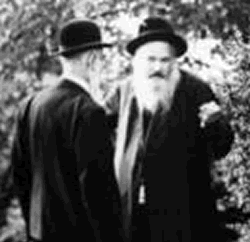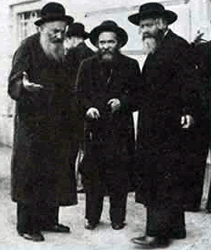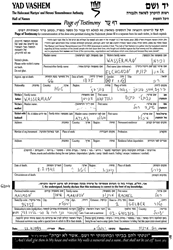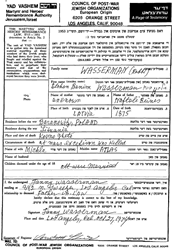Rabbi Elchonon Wasserman
From Wikipedia, the free encyclopedia
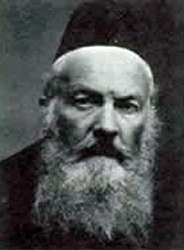
Elchonon Wasserman
Rosh yeshiva in Baranowicze
Born 1875
Birz, Lithuania
Died 1941
Ninth Fort, Kaunas, Lithuania
Education Telshe yeshiva
Children Simcha, Naftoli, Dovid
Rabbi Elchonon Wasserman (1875-1941) (Hebrew: ×?×œ×—× ×Ÿ וסר×?ן) was a prominent Rabbi and Rosh Yeshiva in pre-World War II Europe. He was one of the Chofetz Chaim's closest disciples and a Torah scholar of note, and well known for being a strong opponent of secular Zionism
Rabbi Wasserman was born in Birz, Lithuania. He studied in the Telshe Yeshiva in Telz, Poland under Rabbi Eliezer Gordon and Rabbi Shimon Shkop and also at Volozhin. Thereafter, he studied under Rabbi Chaim Soloveitchik in Brisk.
He was appointed head of the Yeshiva of Amtshilov, where he won a reputation as an outstanding teacher. In 1907, after his marriage, he studied in the Kollel Kodshim in Radin, Russia, headed by the Chofetz Chaim. In 1910 he was appointed Rabbi of Brisk (now in Belarus), but during World War I returned to Radin.
The yeshiva moved to Smilovichi and Rabbi Wasserman was appointed its Rosh Yeshiva. After the War, he moved to Baranowicze, Poland (now in Belarus) where he founded a yeshiva which became one of the most famous in Europe. He was one of the leaders of the Agudath Israel movement and was regarded as the spiritual successor of the Chofetz Chaim.
Rabbi Wasserman had several sons. Rabbi Simcha Wasserman served as Dean of Yeshiva Beth Yehudah in Detroit in the 1940's, founded Yeshiva Ohr Elchonon in California in the 1950's, and later founded Yeshiva Ohr Elchonon in Jerusalem. Rabbi Wasserman's other sons were Naftoli and Dovid.
When World War II broke out Rabbi Wasserman fled to Vilna, Lithuania, and in 1941, while on a visit to Kovno, was arrested by the Nazis with 12 other rabbis and sent to his death.
Works
Rabbi Wasserman was famous for his clear, penetrating Talmudic analysis. His popular works, essential material in yeshivos around the world, include:
* Kovetz Heoros
* Kovetz Shiurim
* Kovetz Maamarim
He also wrote Ikvasa di-Meshicha and published the responsa of the Rashba with annotations in 1932. His talmudic novellae appeared in the rabbinic journal Sha'arei Tzion (1929–34) and in other publications.
* Beth Hatefutsoth Personality of the Week
Rabbi Elchonon Wasserman
in 1921 that Reb Elchonon returned to Poland, to Baranovitch, where he was asked to head the local yeshiva, Ohel Torah. He was to head the yeshiva till the war years when he, together with hundreds of his students sanctified the Almighty's name. Witnesses have recounted that dreadful day--eleventh day in Tamuz, 5701 when the murderers came in. He was in the midst of learning Tractate Nidoh. Reb Elchonon spoke quietly and calmly, as was his practice. Not even the sound of his voice was changed. On his face, his customary earnestness. His tone betrayed no feeling for self, and he did not attempt to say good-bye to his son, Reb Naftali. He spoke to everyone, to the whole House of Israel.
"In Heaven it appears that they deem us to be righteous because our bodies have been chosen to stone for the Jewish people. Therefore, we must repent now, immediately. There is not much time. We must keep in mind that we will be better offerings if we repent. In this way we will save the lives of our brethren overseas.
"Let no thought enter our minds, G-d forbid, which is abominable and which renders an offering unfit. We are now fulfilling the greatest mizvah. With fire she was destroyed and with fire she will be rebuilt. The very fire which consumes our bodies will one day rebuild the Jewish people." ......
...In the summer of 1937 at the third convention of the rabbinical leaders of Agudath Israel held in Mariband, which included hundreds of rabbis, heads of yeshiva religious academies and grand rabbis of Chassidic communities from a number of countries, Rabbi Elchonon Wasserman stood out from among all of them.
Rabbi Wasserman, Rabbi Blau and Rabbi Kotler
Rabbi Wasserman (left)
with Rabbi Kotler and Rabbi Blau
at the convention in Mariband in 1937
Rabbi Shmuel Aharon Pardes of Chicago, the editor of the rabbinical journal Hapardes, who participated at this convention and who was present at meetings of the Council of Torah Sages that were held during the convention, describes Rabbi Wasserman as follows: "Rabbi Elchonon Wasserman, who stood above all the other participants walked with his face towards the ground. His long beard has turned white, and his fear of G-d preceded his scholarly wisdom. He reigns supreme above all the other members of the Council of Torah Sages and the convention itself. He intersperses his speech with simple metaphors hidden with great wisdom that penetrates the hearts of each person according to his level. He is the major disciple of Rabbi Israel Meir Kagan, the author of the halachic work, Mishna Brurah, and every word he utters is spiced with teachings and wise metaphors from his teacher. When Rabbi Wasserman enters the meeting of the Council, everyone stands in respect, and he asked to speak before anyone else.
On Sunday on the evening of 16th of the Hebrew month of Elul [August 23, 1937], the rabbinical leaders met to discuss the issue of a "Jewish State." The meeting was stormy, and it dealt with the issue of the Three Oaths. A great dispute broke out in the session, and Rabbi Wasserman expressed pungent words that shocked his listeners. The following is what he said:
"We must emphasize and declare the position of our holy Torah in order to banish any confusion of ideas. Inasmuch as there are Jews who are Torah-observant who say that a Jewish State would be the "beginning of the Redemption," we must inform them of the position of our Torah that this is nothing less than the beginning of a new exile. What do I mean? After all, Jews have been living in Exile for some two thousand years, so how can this be a "beginning" of a new Exile? My intention is to expose the so-called Jewish Communists. An Exile such as this has never existed until today. None of us can even describe such an exile, an Exile under Jews! Only Jews from Russia have a slight sense of this situation, even though the regime there is not a "Jewish" one. One of the great rabbis of this generation recently told me that the term "beginning of the Redemption" in reference to the Zionist movement makes his hair stand on end!
"However, it could be said that it does bring the Redemption closer. The great Rabbi Eliyahu of Vilna (who lived in the 18th century) stated (see Kol Yerushalayim, 22 Elul 1937) that effect of Jewish suffering is that it brings the Redemption closer....
http://www.jewsagainstzionism.com/rabbi_quotes/wasserman.cfm
Rabbi Wasserman Naftali
Rabbi Naftali Wasserman was born in Brisk in 1913 to Elchanan and Michla. He was married to Miriam nee Rabinowitz. Prior to WWII he lived in Telz, Lithuania. During the war he was in Telz, Lithuania.Rabbi Wasserman perished in Kovno, Ghetto. This information is based on a Page of Testimony (displayed on left) submitted on 27-Oct-1974 by his sister-in-law FANNY Wasserman nee Abowitz who was born in Knyszyn to Meyer Abowitz and Chana nee Malach
Wasserman Leyb
Leyb Wasserman was born in Radun in 1915 to Elchon and Michla. He was married to Rochl nee Markeninya. Prior to WWII he lived in Telz, Lithuania. During the war he was in Telz, Lithuania. Leyb perished in Kovno, Ghetto. This information is based on a Page of Testimony (displayed on left) submitted on 27-Oct-1974 by his
Wasserman Leah
Leah Wasserman nee Namiot was born in Nowogrodek in 1906 to Hirsh and Rachel. She was married to David. Prior to WWII she lived in Nowogrodek, Poland. During the war she was in Riga, Latvia. Leah perished in Riga, Ghetto. This information is based on a Page of Testimony (displayed on left) submitted on 27-Oct-1974 by her sister-in-law
Wasserman Rochel
Rochel Wasserman nee Markeninya was born in Leipzig. She was married. Prior to WWII she lived in Telschi, Lithuania. During the war she was in Telschi, Lithuania. Rochel perished in Kovno, Ghetto. This information is based on a Page of Testimony (displayed on left) submitted on 27-Oct-1974 by her sister-in-law
Rabbi Weiss Itzchok
Rabbi Itzchok Weiss was born in Yanova to Shmaryahu and Yenta. He was married to Shoshke and had a daughter; Yenta. Prior to WWII he lived in Lubcza, Poland. During the war he was in Lubcza, Poland.Rabbi Weiss perished in 1942 in Novogrudek, Poland. This information is based on a Page of Testimony (displayed on left) submitted on 27-Oct-1974 by his sister-in-law.
Golovciner Mnucha
Mnucha Golovciner nee Abowitz was born in Lubcza in 1909 to Meyer and Chana. She was married to Lazar and had a 4 years old daughter; Ester. Prior to WWII she lived in Riga, Latvia. During the war she was in Riga, Latvia. Mnucha perished in Riga, Latvia. This information is based on a Page of Testimony (displayed on left) submitted on 27-Oct-1974 by her sister; Fanny Wasserman.
The son who survived:
http://www.innernet.org.il/article.php?aid=315
Rabbi Simcha Wasserman was a leader of 20th century Jewry, educating thousands in France, the U.S. and Israel. Beyond his sagely wisdom, Rabbi Wasserman was known for his impeccable character, particularly his sensitivity toward others. Some anecdotes:]
Rabbi Wasserman once visited a former student who was learning in the great Mir Yeshivah in Brooklyn. He dropped in early one afternoon when the students were on their break between learning sessions. After greeting the young man, he suggested that they have lunch while they talk "so that you won't be hungry when you return to your learning. I wouldn't want you to miss your lunch just because of me."
The student agreed, and while they strolled in the neighborhood near the yeshivah, they became so engrossed in their discussion that the young man automatically made his way to a local pizza shop, without thinking that the noisy and smoky place would not be an appropriate place to enter with his great rabbi.
Into the amplified music and the tightly-crowded rows of customers standing around with their orders walked the stately Rabbi Wasserman and his suddenly embarrassed companion. The young man tugged at Rabbi Wasserman's sleeve and stammered, "I... I... I think I made a mistake. We're in the wrong place!"
Rabbi Wasserman motioned for him to relax and as the voices in the room settled and eyes turned toward the elderly rabbinic figure parting the crowd like Moses walking through the walls of water at the Red Sea, Rabbi Wasserman walked straight up to the counter and asked the Israeli proprietor, "Do you serve soup?"
The bewildered man shook his head and apologized that they had no soup in his pizza shop. Rabbi Wasserman looked genuinely sorry, and he too apologized, stating that he would have liked to stay there for lunch but that his doctor had advised him "to stick to things like hot soup when you have lunch."
The Israeli nodded sympathetically and commiserated with the rabbi, and they bid each other "Shalom" as Rabbi Wasserman left with his mystified student.
The young man began to apologize that he hadn't stopped to think that a "hangout" might not be the place to bring his rabbi.
Rabbi Wasserman consoled him and told him no harm was done. "It was no problem!" he laughed. "I didn't want to offend the fellow by just walking out. That's why I asked about soup. This way he'll understand that there was no problem with his restaurant. He won't be offended that an old man didn't stay and eat because there was no soup!"
At a wedding in New York, I encountered Rabbi Wasserman. As we made our way across the now-deserted dining hall to sit down and talk, Rabbi Wasserman kept bending over to pick up challah rolls that had fallen to the floor beneath the tables we passed. I took them from him, telling him that I would pick them up - I refused to let him bend down that way!
"We do not walk over food," he quoted. "It is a disgrace to do so." (Talmud - Eruvin 64b; Bava Metzia 23a)
I nodded, abashed, and placed the collection of uneaten rolls on one of the tables.
Rabbi Wasserman looked sad and said, "You know, even leaving them here is a question; they will just go to waste when the staff comes in to clean up."
I declared, more than asked, "But what can we do? This is the standard they have. No one will re-serve these rolls."
He nodded his head slowly in reluctant acquiescence. "You are right," he said. "What can we do, for this is the standard that is followed these days. It is still hard to watch it happen."
I once accompanied Rabbi Wasserman on some errands which included a visit to the dry cleaners. As he put his garments on the counter, the clerk began to fill out a ticket and asked for his name.
"Wasserman. Samuel Wasserman," he replied.
Once outside, I asked Rabbi Wasserman if he had taken "Samuel" as his legal English name.
He smiled. "No, no. I only give that name when I know they are copying it down. You see, that fellow would never know how to spell 'Simcha' and he would be embarrassed. Besides that, both of us would lose valuable time. Since most people know how to spell 'Samuel,' I use it to make things easier all around
http://www.innernet.org.il/article.php?aid=315
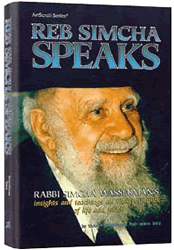
Rabbi Simcha Wasserman was a rosh yeshivah; kiruv pioneer; advisor; foster father; storyteller; transmitter of tradition; founder of yeshivos; hatzalah activist. This book captures him speaking with patience, simplicity, and intellect, about burning topics such as Holocaust, Kabbalah, Providence, and child-rearing. Includes a biographical sketch
Two sons survived the War: Reb Dovid who was in the concentration camps,
and Reb Simcha who remained in the U.S. after coming here with his
father to fundraise for the yeshiva - Ohel Torah in Baranovich. Reb
Dovid died in l975 and is buried in Eretz Hachaim cemetery near Bet
Shemesh. Reb Simcha died four years ago. He had no children. Reb Dovid
had two children: Elchonon, who died of cancer in l982, and Mina - who
is married to me. We live in Newton,Ma with our family.
.....story which Rav Simcha Wasserman told about his father, Rav Elchonon Wasserman, h'yd. Rav Simcha was sitting with his father sometime before WWII and R' Elchonon had just finished telling Rav Simcha that his role in life was to travel to areas where there was a dearth of Torah and spread Torah. In fact, this is exactly what Rav Simcha did, traveling to France, and America. Unfortunately, he and wife remained childless all their lives, but were spiritual parents to thousands of students in the various cities they lived.
Immediately after R' Elchonon had finished instructing R' Simcha that he would be traveling, a man entered to consult with R' Elchonon. The man wanted to move to America because of the ominous situation for the Jews at that time in Europe. R' Elchonon refused to give his approval, and said, "Better for your children to die a physical death here in Europe than die a spiritual death in America."
R' Simcha said that when he heard his father's words to this man, which immediately followed his instructions to his son to travel to Torah wastelands, he knew with certainty that he would never bear children. (Heard from Rabbi Akiva Tatz)
2 Cheshvan
Yahrtzeit of Rabbi Simcha Wasserman, a 20th century Torah sage and son of the illustrious Rabbi Elchanan Wasserman, who was martyred in the Holocaust. Rabbi Wasserman and his wife had no children, but together they educated tens of thousands of Jews in France, the U.S. and Israel. After Rabbi Wasserman's death, his wife died 10 days later. Rabbi Wasserman had a sixth sense about people; the story is told of him looking to purchase a used car in Los Angeles. He went to check out one particular car, and asked the owner if he could take it for a test drive. "How do I know you're not going to steal it?" the man said. Rabbi Wasserman then asked if he could use the telephone for a minute. He called the police and reported a stolen vehicle at that very address. The police arrived, confirmed that the car was indeed stolen, and arrested the man. "How did you know?" the police asked Rabbi Wasserman. "Simple," he said. "When I asked to take it for a test drive, he suspected that I'd steal it. Only a thief thinks that way
Delete Reply Forward
